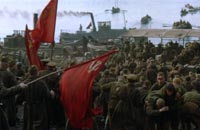
Ever feel like your being watched and you don't
know by whom? There's lots of good reasons to feel
that way nowadays and most of them are hi-tech.
This movie takes that frightening aspect of our daily
existence and turns it into a fast-paced, action-
packed, thrill-a-minute situation that shows things
could be worse, that is if you happened to find
yourself in Robert Clayton Dean's shoes.
Dean (Will Smith) doesn't know it, but he has
received information from a passing (and soon to be
departed) friend concerning the death of a U.S.
congressman. Wow, sometimes it's just not worth
getting out of bed. All Dean wanted to do was buy a
nice piece of lingerie in a chic boutique and, before
you know it, he's a tape carrying member of the
death list. The big, bad guy who winds up on Dean's
tail is an administrator for the National Security
Agency who goes by the name of Thomas Brian
Reynolds (Jon Voight).
(c)copyright Buena Vista International (Netherlands) B.V. , Touchstone Pictures.

|
Yes, not only do the two
main characters in this feature have triple names,
but they're both playing mean games, and for real.
Naturally, since Reynolds has resources and clout at
his disposal, he decides the only way to solve the
problem (i.e. Dean) is to erase it. Now, get this
straight: he doesn't work for the FBI or CIA, but for
the extremely low-profile NSA (so low-profile, in fact,
that in real life it is jokingly referred, among those
who know in the States, as No Such Agency). He
figures it'll be easy enough to commit the perfect
crime, because he's in the perfect position to wipe
away all traces. He doesn't expect Dean's
intelligence, cleverness, and ingenuity to lead him to
a near perfect solution in the form of an ex-
intelligence operative known as Brill (Gene
Hackman).
Actor Will Smith has managed to carve his own
niche on the silver screen in next to no time. Adding
this gem to "Mars Attacks!" and "Men in Black" is no
mean feat. It looks like everybody'll be after him
now. (Weren't they already, Will?) Smith's
fascination with technology and computers easily
extended itself into the related elements of this story.
As he says, "Once we say something, there can be a
microphone, once we go out, there can be a camera,
every aspect of your life can be monitored and that's
what happens to Robert Clayton Dean. They
destroy him. They ruin his credit, they create doubt
in his wife using photographs, they give false
information to his employer and they plant
misinformation in the media."
Gene Hackman's role as an ex-intelligence operative
(a hunted man fighting for years to retain control
over his own life) who lives in a more-than-familiar
warehouse building with a wire-fence-invasion-
control-double-interior and safety gadgets attached
throughout, might possibly remind the avid viewer of
an earlier role (in Coppola's "The Conversation")
where he gave an inspired performance of a man
suffering from justified paranoia.
Director Tony Scott knows how to keep the tension
flowing with the assistance of David Marconi`s
cleverly constructed script so that the viewer stays
on the edge of his seat throughout this captivating
cat-and-mouse chase through a hi-tech paranoid
circus of today's world. (He also let's you know it
could possibly be you, if things should ever go
wrong.) Of course, Scott is no stranger to thrills,
having already marked up a track record on several
other productions made in collaboration with Jerry
Bruckheimer, including "Top Gun," "Crimson Tide,"
"Beverly Hills Cop II," and "Days of Thunder."
Producer Bruckheimer explains that "For many years
the government denied the existence of the NSA."
Seemingly at ease about the whole situation he
further explains, "I think there's a new openness
now and they feel it's better to work with Hollywood.
Through a connection of David Marconi's, we were
able to meet the number two guy there a week
before he retired even though they weren't directly
involved with the movie."
Visiting the CIA as part of his research for the role,
Smith also comments that "What's really amazing is
that you have to imagine that anything you see in a
movie is probably already 10 to 15 years behind
what they actually have. The things we saw in their
archives -- computers that could tell what you are
typing on a typewriter just from the sound, cameras
in toothpicks, and all of this technology was old,
things they don't use anymore!"
And to get down to the real nitty-gritty, in 1995
newspaper journalists Scott Shane and Tom
Bowman reported in The Baltimore Sun that "The
National Security Agency's job is to protect U.S.
government communications from eavesdroppers
and to eavesdrop on foreign countries. In spy jargon
such eavesdropping is called signals intelligence, or
SIGINT. It includes the interception of voice or text
messages sent by phone, fax, computer or other
means, as well as such nonverbal transmissions as
radar and electronic signals from missiles." In short,
watch out everybody.
"Three Days of the Condor" may have been the old
way; this is the new. Some things never change.
The more security grows as an ideal form of control
for certain politically orientated organizations and
the safer their members feel with what they deem to
be necessary, the more every citizen becomes
cornered. Privacy laws are, more often than not, an
easy way of installing a surveillance system on
nations.
So pursed, so terrifying, so now. Don't look over
your shoulder, you might see someone. On the
other hand, you might not. Which one is worse?
© 1994-2006 The Green Hartnett
|

